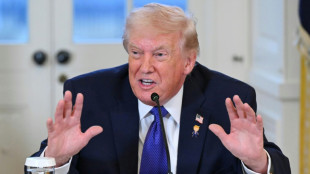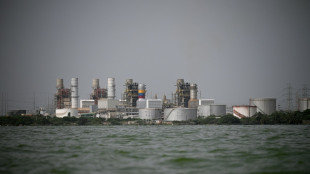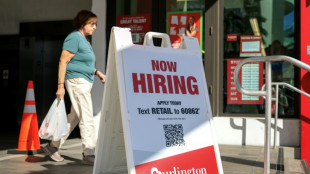-
 Sabalenka into third straight Brisbane final ahead of Australian Open
Sabalenka into third straight Brisbane final ahead of Australian Open
-
Chinese villagers struggle for heat as gas subsidies fade

-
 North Korea accuses South of another drone incursion
North Korea accuses South of another drone incursion
-
Wrexham manager glad Ryan Reynolds on hand for heroics against Forest

-
 Arrests reported, cross removed as China crackdown on unofficial churches grows
Arrests reported, cross removed as China crackdown on unofficial churches grows
-
Wrexham ride 'rollercoaster' to knock Nottingham Forest out of FA Cup

-
 Mavs' Davis has ligament damage in left hand: report
Mavs' Davis has ligament damage in left hand: report
-
Mavs' Davis has ligament damaged in left hand: report

-
 Australia declares state of disaster as bushfires rage
Australia declares state of disaster as bushfires rage
-
Morocco coach Regragui urges calm as hosts reach AFCON last four

-
 Koepka applies for PGA Tour reinstatement: reports
Koepka applies for PGA Tour reinstatement: reports
-
Bath and Edinburgh close in on Champions Cup last 16

-
 Anger over Minneapolis shooting probe fuels protests
Anger over Minneapolis shooting probe fuels protests
-
Hosts Morocco march on to AFCON semis as Senegal reach last four

-
 Trump pitches Venezuela oil to US majors - and hits skepticism
Trump pitches Venezuela oil to US majors - and hits skepticism
-
Ebnoutalib scores on debut as Dortmund drop points at Frankfurt

-
 Winter Olympic organisers insist ice hockey arena ready despite hole in rink
Winter Olympic organisers insist ice hockey arena ready despite hole in rink
-
Diaz scores again as hosts Morocco beat Cameroon to reach AFCON semis

-
 Minneapolis asks to join probe into woman's killing by immigration officer
Minneapolis asks to join probe into woman's killing by immigration officer
-
MLB hands German outfielder Kepler 80-game doping ban

-
 MLB hands German outfielder Kepler 80-game doing ban
MLB hands German outfielder Kepler 80-game doing ban
-
Brazil's Endrick says Lyon 'ideal club' to boost World Cup ambitions

-
 Brew, smell, and serve: AI steals the show at CES 2026
Brew, smell, and serve: AI steals the show at CES 2026
-
Young 'ecstatic' about NBA move from Hawks to Wizards

-
 Trump meets oil executives, says $100 bn pledged for Venezuela
Trump meets oil executives, says $100 bn pledged for Venezuela
-
Venezuela says in talks with US to restore diplomatic ties

-
 De Klerk fireworks guide Bengaluru to victory in WPL opener
De Klerk fireworks guide Bengaluru to victory in WPL opener
-
Uganda's Kiplimo seeks third world cross country crown in a row

-
 Olympic ice hockey arena will be ready for Games: IOC director
Olympic ice hockey arena will be ready for Games: IOC director
-
Recalled Ndiaye takes Senegal past 10-man Mali into AFCON semis

-
 'Devastated' Switzerland grieves New Year inferno victims
'Devastated' Switzerland grieves New Year inferno victims
-
Man pleads guilty to sending 'abhorrent messages' to England women's footballer Carter

-
 PGA Tour unveils fall slate with Japan, Mexico, Bermuda stops
PGA Tour unveils fall slate with Japan, Mexico, Bermuda stops
-
'Unhappy' Putin sends message to West with Ukraine strike on EU border

-
 Fletcher defends United academy after Amorim criticism
Fletcher defends United academy after Amorim criticism
-
Kyiv mayor calls for temporary evacuation over heating outages

-
 Families wait in anguish for prisoners' release in Venezuela
Families wait in anguish for prisoners' release in Venezuela
-
Littler signs reported record £20 million darts deal

-
 'Devastated' Switzerland grieves deadly New Year fire
'Devastated' Switzerland grieves deadly New Year fire
-
Syria threatens to bomb Kurdish district in Aleppo as fighters refuse to evacuate

-
 Britain's Princess Catherine 'deeply grateful' after year in cancer remission
Britain's Princess Catherine 'deeply grateful' after year in cancer remission
-
Russia joins Chinese, Iran warships for drills off South Africa

-
 40 white roses: shaken mourners remember Swiss fire victims
40 white roses: shaken mourners remember Swiss fire victims
-
German trial starts of 'White Tiger' online predator

-
 Stocks rise despite mixed US jobs data
Stocks rise despite mixed US jobs data
-
'Palestine 36' director says film is about 'refusal to disappear'

-
 US December hiring misses expectations, capping weak 2025
US December hiring misses expectations, capping weak 2025
-
Switzerland 'devastated' by fire tragedy: president

-
 Rosenior not scared of challenge at 'world class' Chelsea
Rosenior not scared of challenge at 'world class' Chelsea
-
Polish farmers march against Mercosur trade deal

France's debt is growing
France is facing an unprecedented financial challenge. With public debt exceeding €3.2 trillion, representing more than 110% of gross domestic product (GDP), the eurozone's second-largest economy is on a dangerous path. The budget deficit is around 5.5% of GDP and is expected to rise to over 6% this year. These figures significantly exceed EU targets, which allow a maximum deficit of 3% and a debt ratio of 60% of GDP. The financial markets are becoming increasingly nervous, and interest rates on French government bonds are climbing to record levels. What has led to this debt chaos, and how can France avoid the looming abyss?
The roots of the crisis run deep. For decades, France has had a relaxed attitude towards debt, which differs from the strict budgetary discipline of other countries such as Germany. During the coronavirus pandemic and the energy crisis resulting from the war in Ukraine, the government pumped billions into the economy to support households and businesses. Subsidies for electricity prices and generous social benefits kept the economy stable but led to a sharp rise in debt. Since 2017, when President Emmanuel Macron took office, public debt has grown by almost one trillion euros. Critics accuse the government of delaying necessary structural reforms, while the government's spending ratio is just under 60% of GDP – one of the highest in the world.
The political situation is exacerbating the crisis. Following early parliamentary elections in the summer of 2024, parliament is fragmented and majorities are difficult to form. Prime Minister François Bayrou, who has been in office since autumn 2024, has presented an ambitious austerity programme to reduce the deficit to below 3% by 2029. The measures include the abolition of two public holidays, a freeze on pensions and social benefits, the elimination of 3,000 civil service jobs and higher taxes on high incomes. However, these plans are meeting with fierce resistance. The right-wing nationalist party Rassemblement National and left-wing parties are threatening votes of no confidence, which could bring down Bayrou's government. His predecessor, Michel Barnier, was forced to resign after only three months in office when his draft budget failed.
The financial markets are watching the situation with suspicion. Interest rates on French government bonds are now exceeding those of Greece in some cases, which is an alarming sign. France spends around 50 billion euros a year on debt servicing alone, and the trend is rising. Experts warn that this figure could climb to between 80 and 90 billion euros by 2027, making investment in education, infrastructure and climate protection virtually impossible. Rating agencies such as S&P and Moody's still rate France's creditworthiness as solid, but have threatened downgrades if the deficits are not reduced.
The crisis also has European dimensions. France is systemically important for the eurozone, and an uncontrolled rise in debt could jeopardise the stability of the single currency. Unlike the Greek debt crisis in 2008, when rescue funds were used, a bailout package for France would be almost impossible to finance. The EU has launched disciplinary proceedings against France to exert pressure for budget consolidation, but political instability is hampering reforms.
What can France do? Bayrou's austerity plans are a first step, but their implementation is uncertain. Tax increases are politically sensitive, as France already has one of the highest tax rates in Europe. Spending cuts could slow economic growth, which is just over 1% this year. At the same time, experts are calling for structural reforms to increase productivity and reduce dependence on the public sector. Without clear political majorities, there is a risk that France will slide further into debt.
Citizens are already feeling the effects of the crisis. Strikes and protests against austerity measures are on the rise, and social tensions are running high. Many French people feel caught between high living costs and impending cuts. The government faces the challenge of regaining credibility without losing the trust of the markets or the population.
A way out of the debt chaos requires courage and a willingness to compromise. Bayrou has described the situation as ‘the last stop before the abyss.’ Whether France can overcome this crisis depends on whether politicians and society are prepared to make tough decisions. Time is pressing, because the financial markets will not tolerate any further delays. France is at a crossroads – between reform and risk.

Mexico defies Trump's demands

Iran's nuclear dilemma: peace or war?

Trump's expanded tariff risk

East Asia united against Trump

India-Pakistan Tensions Surge

China Strikes Back: Tariff War

Spain: China's Gateway to Europe

Europe's Economic Self-Sabotage

Trump fails due to Russia's tough stance

Pope Francis: A Transformative Legacy

Portugal: Living Costs Soar



